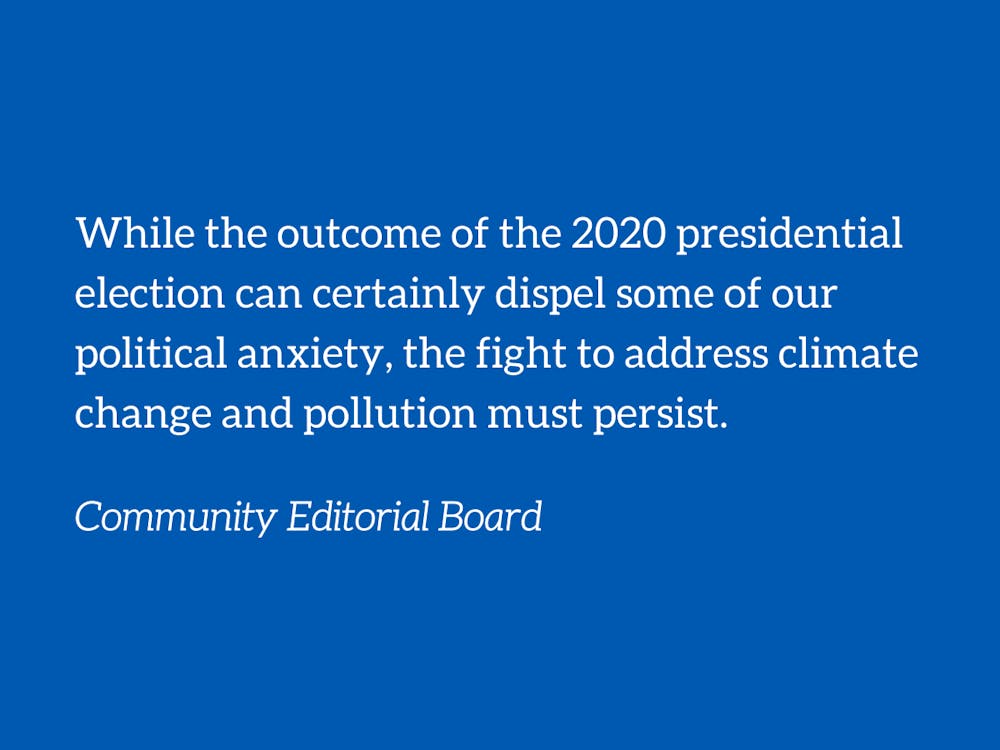While strolling down Union Circle on East Campus, it’s hard to ignore the groups of students leisurely studying, the perfectly manicured lawns, or the Southern traditional-style dorms. But a quick glance toward Marketplace reveals something less picturesque: trash cans overflowing with single-use takeout containers. In an election cycle where activists have placed significant emphasis on the reality of climate degradation and environmental justice, our on-campus wastefulness serves as a concerning bellwether for environmentalism’s further decline at Duke.
It’s safe to say that Duke has always had its fair share of sustainability issues on campus. However, concerns about the spread of COVID-19 have exacerbated the lack of sustainable practices. On July 26th, Duke Dining officially announced their plan for the fall semester which included a switch to socially distanced ordering and completely to-go dishware as safety precautions. When combined with the existing lack of composting bins on campus, the ramifications of this decision quickly start to pile up. Additionally, Duke’s 15,000 weekly COVID-19 tests, which have been instrumental in keeping weekly case numbers at bay, produce multiple forms of plastic waste per test. While these precautions may be necessary to promote the health and safety of Duke students and faculty, the adverse environmental effects should not be overlooked.
The mass mobilization of Duke’s student body this semester to advocate for social justice issues, from Black Lives Matter to abolishing Greek life and voter registration, has proven that the activist spirit is alive and thriving on campus. As well-informed students, we must now acknowledge the vast intersection of environmentalism with these same issues. The growing field of environmental justice reflects the reality that issues of environmental degradation and sustainability have deep ties to systemic structures of racism and inequality. Both Duke students and Duke University as an institution should use our privileged position to take the necessary steps to address our ties to this issue.
Duke as we know it today is the product of a history of campus activism. In 1986, Duke students held numerous gatherings in front of the Allen Building urging the university to divest any holdings based in Apartheid South Africa, and eventually the Board of Trustees gave in. While powerful entities like Duke should independently take responsibility for the role they plan in systems of violence and oppression, we, as Duke students, should now utilize the activist-spirit generated this election to advocate for these necessary changes.
Duke has continued some of its environmental initiatives like the Duke Climate Action Plan, but a vast majority of sustainability initiatives have been put on pause due to the pandemic. All this begs the question: how can Duke students simultaneously advocate sustainability in their day-to-day lives while also staying safe? While Duke has eliminated the ability to use reusable containers for food, students can still opt to use their own reusable utensils in place of the single-use ones offered. Students can also bring their used containers back to the Brodhead Center for composting. Additionally, students should still embrace general principles of sustainability such as water and energy conservation.
All these recommendations come with an acknowledgement that individuals are not responsible for systemic issues created by corporate entities and governmental institutions. While small actions by students are still better than no action at all, powerful institutions like Duke University hold the most potential to initiate meaningful change. Campus organizations like Duke Climate Coalition, Environmental Alliance, Sustainable Ocean Alliance and the Undergraduate Environmental Union, to name a few, are already leveraging our communal power to advocate for institutional change like fossil fuel divestment, increased composting, environmental literacy requirements, campus farm initiatives and carbon neutrality.
Addressing sustainability only through the lens of “save the turtles” ignores the malicious results of corporate/capitalist greed intertwined with lax environmental regulations. Beyond the limits of campus, students should seek to educate themselves about local Durham or national initiatives addressing environmental justice. The Sunrise Movement organization has a Durham hub that advocates for environmentalism through policy, specifically the Green New Deal, while also addressing racial and economic inequality. The NC Environmental Justice Network is a nonprofit organization centered around issues like coal ash, landfills, and environmental justice in BIPOC communities. Additionally, students can read books like As Long As Grass Grows, Youth to Power, and A Terrible Thing to Waste to learn about the origins and future of an intersectional environmental movement that is justice-centered.
While the outcome of the 2020 presidential election can certainly dispel some of our political anxiety, the fight to address climate change and pollution must persist. These issues have disproportionately affected marginalized communities for far too long, and now is the time to transition our election-related activism to the environmental movement. While small changes to one’s daily routine can be impactful, we must also rally together to push corporations to take responsibility for the damaging actions that our current economic and political systems have enabled and promoted for so long.
The Community Editorial Board is independent from the editorial staff of the Chronicle. Their column runs on alternate Mondays.
Get The Chronicle straight to your inbox
Signup for our weekly newsletter. Cancel at any time.

